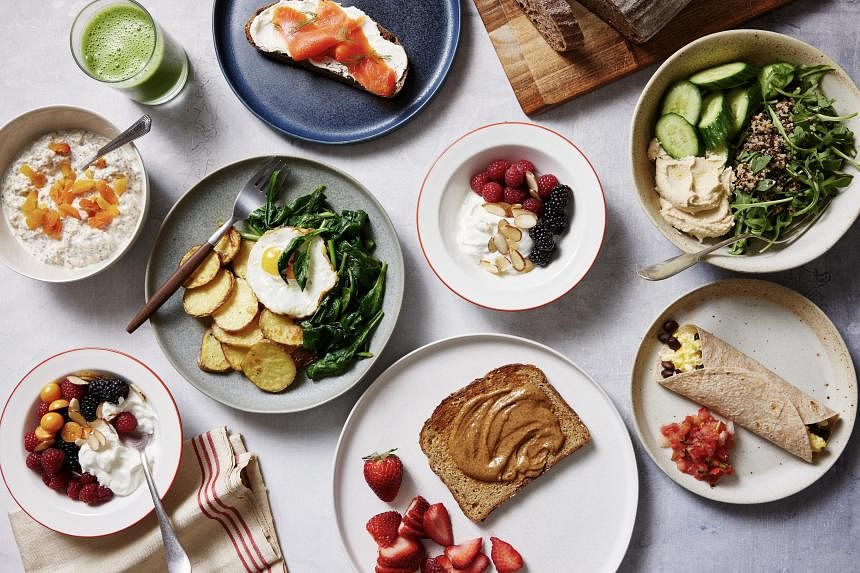NEW YORK – Each day, an estimated 10 to 20 per cent of adults in the United States skip breakfast.
And that, nutrition experts say, may be a mistake.
Not only does a morning meal provide the fuel you need to start your day, but numerous studies have also found that eating breakfast regularly is associated with a range of health benefits.
These include reduced risks for obesity, cardiovascular disease and Type 2 diabetes; as well as improved short-term memory in adults, better school performance in children and better diet quality overall, said registered dietitian and associate professor of medicine Kathryn Starr at Duke University School of Medicine.
“All our meals are important; I don’t think breakfast is the most important meal,” Prof Starr said. But it “kick-starts the process for our body to function properly”.
To maintain healthy blood sugar, energy and fullness levels until your next meal, getting the right balance of protein, fibre and unsaturated fats at breakfast is important, said registered dietitian Lauren Harris-Pincus in New Jersey. This roughly translates to at least 20g of protein, 8 to 10g of fibre and 10 to 15g of unsaturated fats, totalling about 300 to 350 calories.
But it is important not to get hung up on the numbers, said professor of nutrition science and policy Alice H. Lichtenstein at the Friedman School of Nutrition Science and Policy at Tufts University.
Your nutrient needs will depend on your weight, activity level, age and health conditions, Prof Lichtenstein said.
More important, she said, is focusing on what you enjoy and makes you feel energised and sated. “So many times we’ve tried to give people formulas,” she said, “and if you look at dietary patterns and scores in the US, we’re not doing that well as far as diet quality goes.”
“So what’s the ideal breakfast?” she said. “It’s whatever makes your body work best.”
Pay extra attention to protein
One thing to prioritise when planning your morning meal, Ms Harris-Pincus said, is protein.
Many Americans consume more than enough protein throughout the day, she said, but they often do not get enough at breakfast – and instead, opt for foods high in refined sugars or other carbohydrates, such as bagels, pastries or energy bars.
The Life List: Seven ways to cut salt from your diet
Eating out: How to pick healthier options
If they do prioritise protein, Prof Starr said, they frequently choose foods high in saturated fats, such as bacon or sausage, which can increase the risk for cardiovascular disease.
Your body needs protein to maintain your muscle mass, metabolism and physical strength, among other things, Ms Harris-Pincus said, but it can use only about 25 to 35g of protein a meal for those purposes.
If you consume more protein in one sitting, your body will either use it as energy, store it as fat or excrete it.
So if you “skip breakfast or don’t eat protein at breakfast”, Ms Harris-Pincus said, “you lose that opportunity because you can’t double up on protein later”.
Remember the ‘shortfall’ nutrients
Calcium, vitamin D, potassium and fibre are commonly called shortfall nutrients, Ms Harris-Pincus said, because people in the US often do not get enough of them.
Over time, deficiencies in such nutrients can lead to problems including weak bones, poor gut health and high blood pressure.
But it so happens that many healthy breakfast foods are packed with those nutrients.
Most fortified cow’s milk contains calcium, vitamin D and potassium; most fortified cereals contain vitamin D – just be sure to choose those high in fibre and low in added sugars; bananas, citrus and many dried fruits have potassium; and oats are rich in fibre.
“When you think about something like a bowl of whole grain cereal and milk with some fruit, that really makes a dent in those shortfall nutrients,” Ms Harris-Pincus said.
Do not be limited
You do not have to confine yourself to standard breakfast fare to get a mix of nutrients in the morning, said director of nutrition Josephine Connolly-Schoonen at Stony Brook Medicine.
“Any whole, plant-based food is going to have lots of phytonutrients,” she said, which are antioxidants that protect your cells from damage. These foods also contain fibre, which helps you stay full and supports gut health.
Overnight oats, bubble tea and hotpot: What do nutrition experts eat?
Prata is cheaper in the west while kopi is cheaper in central S’pore: IPS study
Coffee and tea can also provide some antioxidants and be part of a nutritious breakfast, associate clinical professor Connolly-Schoonen said. Just do not overdo it on the sugar or cream.
She said that taking your time and enjoying your food is important. Eat when you are hungry, stop when you are full, she added.
And breakfast does not have to be first thing in the morning.
“If you wake up and go to an exercise class at 7.30am, you might have a few bites of something if you’re hungry, go to the class and come back and finish breakfast,” she said. “Whatever works for you.” NYTIMES
Join ST’s Telegram channel and get the latest breaking news delivered to you.
p.st_telegram_boilerplate:before {
display: inline-block;
content: ” “;
border-radius: 6px;
height: 6px;
width: 6px;
background-color: #12239a;
margin-left: 0px;
margin-right: 13px;
}
a.st_boilerplate {
font-family: “SelaneWebSTForty”, Georgia, “Times New Roman”, Times, serif;
}


